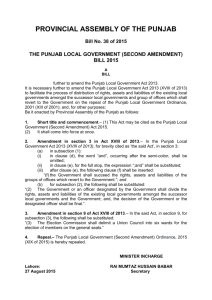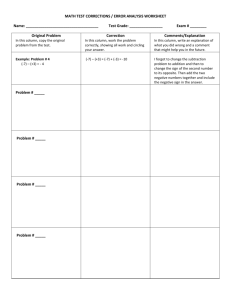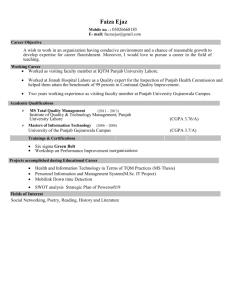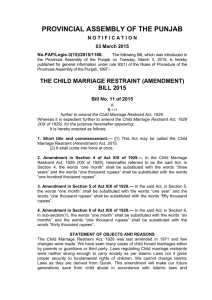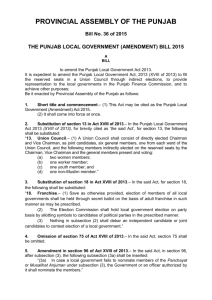A - Provincial Assembly of Punjab
advertisement
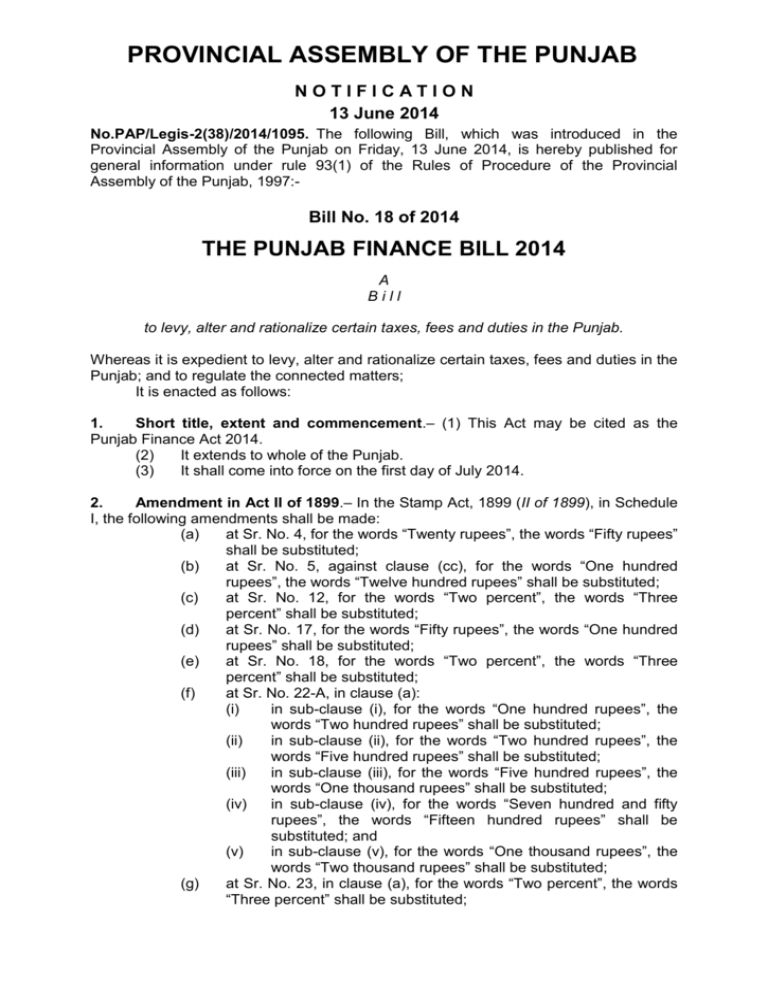
PROVINCIAL ASSEMBLY OF THE PUNJAB NOTIFICATION 13 June 2014 No.PAP/Legis-2(38)/2014/1095. The following Bill, which was introduced in the Provincial Assembly of the Punjab on Friday, 13 June 2014, is hereby published for general information under rule 93(1) of the Rules of Procedure of the Provincial Assembly of the Punjab, 1997:- Bill No. 18 of 2014 THE PUNJAB FINANCE BILL 2014 A Bill to levy, alter and rationalize certain taxes, fees and duties in the Punjab. Whereas it is expedient to levy, alter and rationalize certain taxes, fees and duties in the Punjab; and to regulate the connected matters; It is enacted as follows: 1. Short title, extent and commencement.– (1) This Act may be cited as the Punjab Finance Act 2014. (2) It extends to whole of the Punjab. (3) It shall come into force on the first day of July 2014. 2. Amendment in Act II of 1899.– In the Stamp Act, 1899 (II of 1899), in Schedule I, the following amendments shall be made: (a) at Sr. No. 4, for the words “Twenty rupees”, the words “Fifty rupees” shall be substituted; (b) at Sr. No. 5, against clause (cc), for the words “One hundred rupees”, the words “Twelve hundred rupees” shall be substituted; (c) at Sr. No. 12, for the words “Two percent”, the words “Three percent” shall be substituted; (d) at Sr. No. 17, for the words “Fifty rupees”, the words “One hundred rupees” shall be substituted; (e) at Sr. No. 18, for the words “Two percent”, the words “Three percent” shall be substituted; (f) at Sr. No. 22-A, in clause (a): (i) in sub-clause (i), for the words “One hundred rupees”, the words “Two hundred rupees” shall be substituted; (ii) in sub-clause (ii), for the words “Two hundred rupees”, the words “Five hundred rupees” shall be substituted; (iii) in sub-clause (iii), for the words “Five hundred rupees”, the words “One thousand rupees” shall be substituted; (iv) in sub-clause (iv), for the words “Seven hundred and fifty rupees”, the words “Fifteen hundred rupees” shall be substituted; and (v) in sub-clause (v), for the words “One thousand rupees”, the words “Two thousand rupees” shall be substituted; (g) at Sr. No. 23, in clause (a), for the words “Two percent”, the words “Three percent” shall be substituted; 2 (h) (i) (j) (k) (l) (m) (n) (o) (p) (q) (r) (s) at Sr. No. 27-A, for the words “Two percent”, the words “Three percent” shall be substituted; at Sr. No. 29, for the words “Thirty rupees”, the words “One hundred rupees” shall be substituted; at Sr. No. 31, for the words “two percent”, the words “Three percent” shall be substituted; at Sr. No. 33, for the words “Two percent”, the words “Three percent” shall be substituted; at Sr. No. 40, for the words “Two percent”, wherever occur, the words “Three percent” shall be substituted; at Sr. No. 46: (i) in clause (a), for the words “One hundred rupees”, the words “Two hundred rupees” shall be substituted; and (ii) in clause (b), for the words “Five hundred rupees”, the words “One thousand rupees” shall be substituted; at Sr. No. 48: (i) in clause (b), for the words “Two percent”, the words “Three percent” shall be substituted; and (ii) in clause (bb), for the words “One thousand rupees”, the words “Twelve hundred rupees” shall be substituted; at Sr. No. 55, for the words “Two percent”, the words “Three percent” shall be substituted; at Sr. No. 58, in clause A, for the words “Two percent”, wherever occur, the words “Three percent” shall be substituted; at Sr. No. 63, for the words “Two percent”, the words “Three percent” shall be substituted; at Sr. No. 63-A, for the words “Two percent”, the words “Three percent” shall be substituted; and at Sr. No. 64, for the words “One hundred rupees”, wherever occur, the words “Two hundred rupees” shall be substituted. 3. Amendment in Act V of 1958.– In the Punjab Urban Immovable Property Tax Act, 1958 (V of 1958): (a) in section 3, in subsection (2), for the word “twenty”, the word “five” shall be substituted; (b) in section 4: (i) in clause (c): (a) in sub-clause (i), for the words “one thousand and eighty”, the words “four thousand three hundred and twenty” shall be substituted; and (b) in sub-clause (ii), for the words “one thousand six hundred and twenty”, the words “six thousand four hundred and eighty” shall be substituted; and (ii) in clause (g), for the words “forty-eight thousand and six hundred”, the words “two hundred forty three thousand” shall be substituted; and (c) in section 7, in subsection (2), for the expression “on the first day of July or the first day of January as the case may be, next following the date on which it is finally approved by the assessing authority”, the words “on the date notified by the Government after the approval of the valuation list by the assessing authority” shall be substituted. 4. Amendment in Act XXXII of 1958.– In the Punjab Motor Vehicles Taxation Act, 1958 (XXXII of 1958), in the Schedule: (a) at S.No.4: 3 in column No. 2, for the expression “Motor vehicles (motor cars or jeeps) other than those mentioned above and having”, the expression “Motor vehicles (motor cars or jeeps) other than those mentioned above or below, and having” shall be substituted; and (ii) in column No. 3, for the existing entries, the following shall, respectively, be substituted: “Rs. 500/Rs. 1800/Rs. 6000/Rs. 9000/Rs. 12000/Rs. 15000/Rs. 2500/- per seat Rs. 300/- per seat.” after S.No.4, in column Nos. 1 to 3, the following entries at S.No.5 shall be inserted: (i) (b) S.N Description of Motor Vehicles o “5. Imported motor vehicles (motor cars or jeeps): (i) (ii) (iii) Annual Rate of Tax with engine power 1590 cc but not exceeding 1990 cc; Rs.20,000/- with engine power exceeding 1990 cc but not exceeding 2990 cc; and Rs.25,000/- with engine power exceeding 2990 cc. Rs.35,000/- Explanation: I Imported motor vehicle here means a motor vehicle which is manufactured abroad within last five years prior to the tax year. Explanation: II An imported motor vehicle older than five years shall be liable to annual rate of tax under S. No. 4, above.” 5. Amendment in Act I of 1965.– In the Punjab Finance Act, 1965 (I of 1965), section 12 shall be omitted. 6. Amendments in Act XLII of 2012.– In the Punjab Sales Tax on Services Act 2012 (XLII of 2012): (a) in section 2: (i) in clause (6), for the words “any law”, the expression “the Punjab Revenue Authority Act 2012 (XLIII of 2012)” shall be substituted; (ii) in clause (29), after sub-clause (a), the following sub-clause (aa) shall be inserted: “(aa) an association of persons;” (iii) in clause (38), in the “Explanation”, after the word “supply”, a comma and the word“, disposition” shall be inserted; and (iv) in clause (43), in sub-clause (d), after the word “underpaying”, the words “or not paying” shall be inserted; 4 (b) (c) (d) (e) (f) (g) (h) (i) in section 7, in subsection (1), after the words “The value of a taxable service is the”, the words “gross amount of” shall be inserted; in section 25, after subsection (5), the following explanation shall be inserted: “Explanation.– Unless otherwise specified, no person shall be absolved of any tax liability for want of registration under this Act or the rules.”; after section 29, the following section 29A shall be inserted: “29A. Restoration of registrations.– The Authority may, subject to conditions as may be prescribed, reactivate, revive, reinstate or restore any registration which has been de-activated, suspended or cancelled for any reason or under any circumstances.”; in section 31: (i) in subsection (1), after the words “A registered person providing taxable service”, the words “or a person required to pay tax under this Act or rules” shall be inserted; and (ii) in subsection (2), after the word “providing”, the words “or receiving” shall be inserted.”; in section 48, in subsection (2), in the TABLE: (i) at S.No.1, in column No. 3, for the words “ten thousand”, the words “fifty thousand” shall be substituted; and (ii) at S.No.10, in column No. 2, after the word “both”, for the full stop, a colon shall be substituted and thereafter the following proviso shall be inserted: “Provided that where any recipient of a service does not pay the amount of tax due to be paid to a service provider, such recipient shall also be liable to action for obstruction under this provision.”; in section 52, in subsection (1), for the words “three years”, the words “five years” shall be substituted; in section 70, after subsection (2), the following subsection (3) shall be inserted: “(3) For the purpose of recovery of tax, penalty or any other demand or sum under this Act or the rules, the Authority or the officer of the Authority may exercise the powers of a Civil Court under the Code of Civil Procedure, 1908 (V of 1908) for recovery of an amount due under a decree and, in such an eventuality, the Authority or the officer of the Authority shall be deemed to be a Civil Court.”; in the Second Schedule: (i) at S.No.1: (a) in column No. 2, after the word “clubs” the words “including race clubs” shall be inserted; and (b) in column No. 3, after the figure and comma, “9801.6000,” the figure and comma “9830.0000,” shall be inserted; (ii) at S.No.4: (a) in column No. 2, after the word “services”, the words “including cargo services by road passenger transportation businesses and transportation through pipeline and conduit services” shall be inserted; and (b) in column No. 3, after the figure “9808.0000”, the word and the figure “and 9804.9000” shall be inserted; (iii) at S.No.8, in column No. 2, for the existing entry, the following shall be substituted: “Services provided by banking companies, cooperative financing societies, modarbas, musharikas, ijarahs, leasing companies, non-banking financial institutions and other persons, businesses or enterprises providing or dealing in any such services.” 5 (iv) (vi) (vii) (viii) (ix) (x) (xi) (xii) (xiii) at S.No.11: (a) in column No. 2, after the word “restaurants”, the words and brackets “including cafes, food (including ice-cream) parlors, coffee houses, coffee shops, deras, food huts, eateries, resorts and similar cooked, prepared or ready-toeat food service outlets etc” shall be inserted; and (b) in column No. 3, after the figure “9801.2000”, the word and figure, “and 9801.9000” shall be inserted; (v) at S.No.13: (a) in column No. 2, after the word “service”, the words “including intellectual property rights services “shall be inserted; and (b) in column No. 3, after the figure “9823.0000”, the word and the figure “and 9839.0000” shall be inserted; at S.No.14, in column No. 2, under the caption “EXCLUDING”, in paragraph (i), after the word “million”, the words “per annum” shall be inserted; at S.No.18, in column No. 2, under the caption “EXCLUDING,” for paragraph (iv), the following shall be substituted: “(iv) the facility of air-conditioning is not installed or available in the premises.”; at S.No.19, in column No. 2, after the word “asset”, the bracket and words “(including investment)” shall be inserted; at S.No.23: (a) in column No. 2, after the word “consultants” the words “including technical inspection and certification services, quality control (standards’ certification), technical analysis and testing, erection, commissioning and installation services” shall be inserted; and (b) in column No. 3, after the figure “9819.9400”, the figures and comma “9861.0000, 9815.5000” shall be inserted; at S.No.24: (a) in column No. 2, after the word “consultants”, the words “including but not limited to human resource and personnel development services, exhibition or convention services, event management services, valuation services (including competency and eligibility testing services), market research services and credit rating services” shall be inserted; and (b) in column No. 3, after the figure “9815.9000”, the expression “9832.0000, 9827.0000, 9818.3000, 9818.2000, 9819.9300, 9852.0000 and 9859.0000” shall be inserted; at S.No.25: (a) in column No. 2, after the word “operators”, the words “and travel agents including all their allied services or facilities” shall be inserted; and (b) in column No. 3, after the figure “9805.5100”, the figures and the word “9805.5000 and 9803.9000” shall be inserted; at S.No.26, in column No. 2, the words “including labour and manpower supplies” shall be inserted; at S.No.30: (a) in column No. 2, for the existing entry, the following shall be substituted: “Share transfer or depository agents including services provided through manual or electronic book-entry system used to record and maintain securities and to register the transfer of shares, securities and derivatives.”; and 6 in column No. 3, for the figures, the words “respective headings” shall be inserted; (xiv) at S.No.32: (a) in column No. 2, after the word “dealers” the words “and realtors” shall be inserted; and (b) in column No. 3, after the figure “9806.2000”, the word and the figure “and 9844.0000” shall be inserted; (xv) at S.No.33: (a) in column No. 2, after the word “designers”, the words and brackets “whether relating to textile, leather, jewellery or other product regimes including allied services such as cutting, stitching, printing, manufacturing, fabrication, assembly, embellishment, adornments, display (including marketing, packing and delivery etc.)” shall be inserted; and (b) in column No. 3, after the figure “9834.0000”, the word and figure “and 9819.6000” shall be inserted; (xvi) at S.No.36, in column No. 3, after the figure “9806.3000”, the word and the figure “and 9845.0000” shall be inserted; (xvii) at S.No.37: (a) in column No. 2, after the bracket at the end, the words “including industrial and commercial packaging services and similar outsourcing of industrial or commercial processes” shall be inserted; and (b) in column No. 3, after the figure, “9868.0000’, the figures and the word, “9841.0000 and 9819.1400” shall be inserted; and (xviii) after S.No.37, in column Nos. 1 to 4, the following entries shall be inserted: Rate of S. No. Description Classification Tax (1) (2) (3) (4) “38 Services provided by specialized workshops 98.20 Sixteen or undertakings (auto-workshops; workshops percent for industrial machinery, construction and earth-moving machinery or other special purpose machinery etc; workshops for electric or electronic equipments or appliances etc. including computer hardware; car washing or similar service stations and other workshops). 39 Services provided for specified purposes 98.22 and Sixteen including fumigation services, maintenance 9860.0000 percent and repair (including building and equipment maintenance and repair including after sale services) or cleaning services, janitorial services, dredging or desilting services and other similar services etc. 40 Brokerage (other than stock) and indenting 9829.0000, Sixteen services including commission agents, under9819.1200, percent writers and auctioneers. 9819.1100, 9819.1300 and 9819.9100 41 Call centres. 9865.0000 Nineteen and a half percent 42 Services provided by laboratories other than 9816.0000 and Sixteen services relating to pathological or diagnostic 98.17 percent (b) 7 43 44 45 46 47 tests for patients. Services provided in specified fields such as health care, gym, physical fitness, indoor sports, games and body or sauna massage etc. Services provided by laundries and dry cleaners. Services provided by cable TV operators. Services provided by TV or radio program producers or production houses. Advertisements (including classified ads) in newspapers, magazines, journals and periodicals. 9821.1000 and 9821.2000 9821.4000 Sixteen percent 9811.0000 Sixteen percent Sixteen percent Sixteen percent Five percent” 9819.9000 9828.0000 9802.4000 7. Amendment in Act XVI of 2013.– In the Punjab Finance Act 2013 (XVI of 2013): (a) in section 2, clause (a) shall be omitted; and (b) section 10 shall be omitted. 8. Luxury house tax.– (1) Subject to the provisions of this section, there shall be charged, levied, assessed and paid a tax, known as luxury house tax, on categories of residential house and at such rate as specified in the First Schedule, located on the immoveable property in the limits of: (a) a notified rating area under the Punjab Urban Immoveable Property Tax Act, 1958 (V of 1958); (b) a cantonment under the Cantonment Act, 1924 (II of 1924); and (c) any other area within the Province as notified by the Government at the rate specified for the remaining rating areas and cantonments under the First Schedule. (2) The tax shall be charged, levied, assessed and paid in addition to any other tax charged and collected under any other law for the time being in force and shall be the first charge upon the residential house. (3) The liability to pay the tax shall be of the owner or occupant, jointly and severally. (4) The tax shall be paid once either in lump sum on or before September 30, 2014 or in four equal quarterly instalments with first instalment payable on or before September 30, 2014 and the subsequent three equal instalments being payable on or before the last day of each concerned quarter. (5) In the event a residential house is constructed after the commencement of this Act, the tax shall be charged, levied, assessed and paid in the above manner and, in such a case, the tax shall be payable in lump sum on or before the last day of the first quarter falling after the completion of construction and, in case of payment in instalments, first instalment being payable on or before last day of the first quarter falling after the completion of construction and the subsequent three equal instalments being payable on or before the last day of each concerned quarter thereafter. (6) In case of lump sum payment, a rebate @ 10% shall be admissible if tax is paid on or before the date fixed for payment. (7) Any person who fails to pay the tax or any part thereof within the prescribed time limit, whether wilfully or otherwise, shall in addition to the amount of the tax be liable to pay default surcharge at the rate of one percent per month of the amount of tax due under this section. (8) Notwithstanding the provisions of subsection (1), an area, residential house or a person specified in any of the categories mentioned in the Second Schedule shall be exempt from the levy and payment of the tax. (9) Notwithstanding the provisions of subsections (1) and (8): 8 (a) the Government may, by notification in the official Gazette, exempt any area within the limits specified in subsection (1), or any residential house or person, from the whole or any part of the tax chargeable under this section, subject to the conditions and limitations specified in the notification; and (b) the grievance committee may in an individual case of hardship, by special order in each case stating the reasons, exempt any residential house as may be specified from payment of the whole or any part of the tax charged under subsection (1) or from the payment of default surcharge under subsection (7). (10) Subject to the provisions of this section, the tax including surcharge payable under subsection (7) shall, as nearly as possible, be paid, recovered, administered and regulated as if it is a tax under the Punjab Urban Immoveable Property Tax Act, 1958 (V of 1958). (11) In case of any dispute relating to tax or exemption from the payment of the tax, a person may file an application before the grievance committee and subject to subsection (12), decision of the grievance committee on such dispute shall be final. (12) Any person or an officer aggrieved by the decision of a grievance committee may, within fifteen days from the date of communication of the decision, prefer an appeal to the Government. (13) The Government may make rules for carrying out the purposes and giving effect to the provisions of this section. (14) In this section: (a) “completion of construction” means the day when a house is ready for occupation or two years from the date of installation of electricity connection, whichever is earlier; (b) “covered area” means the built up area included in the floor of a residential house and where a residential house has more than one floor, the aggregate area in all the floors together; (c) “grievance committee” means a committee of three officers notified by the Government to discharge the functions under this section in any area specified in the notification; (d) “residential house” means building or any other structure built on immoveable property measuring two kanals or more and having a minimum covered area of six thousand square feet; and (e) “tax” means the luxury house tax on a residential house charged, levied and assessed under this section. (15) A word or term used in this section but not defined shall have the same meaning as assigned to it under the Punjab Urban Immoveable Property Tax Act, 1958 (V of 1958). (16) Notwithstanding the omission of section 10 of the Punjab Finance Act, 2013 (XVI of 2013), a person shall not be liable to pay tax under that section but such omission shall not give rise to any right of refund to the person who has paid the tax under that section, provided that such owner or occupant of a residential house shall be entitled to claim adjustment of an equivalent amount from the tax charged, levied, assessed and payable under this section. 9 FIRST SCHEDULE [See section 8(1)] Location In Lahore District including Lahore Cantonment and Walton Cantonment Category House of Residential (1) Two Kanals or above with covered area more than six thousand square feet. -------------------------- Rate of Tax (1) Rs. 250,000/- per Kanal subject to a maximum of Rs. 2000,000/- ----------------------- (2) Eight Kanals or above with covered area more than twelve thousand square feet. (2) Rs. 300,000/- per Kanal subject to a maximum of Rs. 3,600,000/- In rating areas of Divisional Headquarters District and all the Cantonments in the District of Divisional Headquarters (1) Two Kanals or above with covered area more than six thousand square feet. (1) Rs. 200,000/- per Kanal subject to a maximum of Rs. 1,600,000/- (2) Eight Kanals or above with covered area more than twelve thousand square feet. (2) Rs. 250,000/-per Kanal subject to a maximum of Rs. 3,000,000/- In remaining rating areas and Cantonments (1) Two Kanals or above with covered area more than six thousand square feet. (1) Rs.150,000/- per Kanal subject to a maximum of Rs. 1,200,000/- -------------------------- --------------------------------(2) Eight Kanals or above with covered area more than twelve thousand square feet. --------------------------- --------------------------(2) Rs.200,000/- per Kanal subject to maximum of Rs. 2,400,000/- *Provided that for calculating tax for an additional area less than one Kanal, pro rata rates for each full marla shall be applied and area less than one marla shall be excluded. 10 SECOND SCHEDULE [See section 8(8)] 1. A residential house with completion of construction before the first day of January 2001; or 2. An existing residential house which is owned by a person on the basis of opening of inheritance before coming in force of this Act; or 3. A residential house or part thereof, owned by a widow by way of inheritance and used for her permanent residence, provided that if the widow owns more than one residential house liable to tax, she shall be entitled to exemption only in respect of one residential house; or 4. Residential house used for some other permissible use after compliance with applicable law and during such period of compliance. STATEMENT OF OBJECTS AND REASONS In order to rationalize the payment of stamp duty on transfer of rights in immovable properties, it is proposed to be enhanced from 2% to 3% while reducing the registration fee from existing 1% to Rs. 500/- only or Rs.1000/- only depending upon the value of the property. Registration fee is paid only by the parties who get their documents registered within the office of Sub-Registrar. Whereas the persons who get rights in an immovable property transferred in a housing / cooperative society etc. are not paying the registration fee but only paying the stamp duty. This measure will strike the right balance in transfer of properties. The slight enhancement considering the inflation, rates of stamp duty on certain instruments for example affidavit, agreement, cancellation deed, contract, divorce, partnership deed and revocation of trust are proposed to be revised after the year 1995 when these were lastly revised. This will enhance the revenue from Rs. 500/- million to Rs. 600 million. The Government intends to revise valuation list of properties as required under the Punjab Urban Immovable Property Tax Act, 1958, after a period of 13 years. This list will be enforced for the purpose of assessing and collecting the property tax w.e.f. 01.07.2014. Since last revision, rental values of properties have increased manifold, therefore, in order to rationalize increase in tax liability of the taxpayers, the Government intends to reduce the rate of tax from 20% to 5% and also increase the limit of Annual Value for grant of exemption to certain buildings and lands. The Punjab Motor Vehicles Taxation Act, 1958 has been amended several times to keep it up to date according the requirements and to adapt the technological upgradation emerging in road transport and motor vehicle management. Further amendments in the aforesaid Act have become necessary as the need was felt to enhance the revenue of the Province keeping in view the increasing trends of the registration of the vehicles and infrastructure used by these vehicles. The Punjab is collecting sales tax on services from July, 2012 onwards. In this regard, the Punjab Sales Tax on Services Act, 2012 was enacted and Punjab Revenue Authority was established. An unprecedented growth has been registered in Punjab sales tax collections during the last two years mainly due to actual physical expansion of tax coverage in the Province through increase in registrations and encouragement of voluntary compliance and incremental inclusion of new services in the tax net. Based upon the operational experience so far gained by Punjab Revenue Authority, besides certain editorial amendments, some technical amendments have been proposed in the Punjab Sales Tax on Services Act, 2012. The technical amendments covers the issues 11 relating to tax determination for the period during which a taxable business is not registered, reinstatement or restoration of deactivated, suspended or cancelled registrations, rationalization of pecuniary penalties for intentional non-compliance and equalization of arrear recovery with the recovery process of civil courts. The amendments will work to further smoothen the application of the said Act to increase efficiency of Punjab Revenue Authority alongwith facilitation of the taxpayers. In order to plug compliance gaps arising out of the diversities of services tax tariff interpretations, descriptions of several taxable services alongwith classifications have been rationalized so that taxability issues in matching or comparative service regimes may be resolved through acceptable policy intervention. Moreover, some descriptions have been readjusted or slightly modified to accommodate the statutory classificatory scope of services and scope of taxation of services specified in the regulatory framework of the Punjab sales tax on services. Some statutory exemption threshold criteria have been rationalized to forestall escape from tax liabilities in case of services which have traditionally remained out of tax net and are still reluctant to start compliance. With these changes, the disputes relating to express cargo service, tax coverage of financial services, business name manipulations in case of food sector services, tax coverage of technical consultancy service and taxability of several allied services of taxable services of principal business domain, shall be resolved amicably. Besides, ten new such services have been included under the tax net, which were either being partially taxed as part and parcel of taxable services of other business domains or were failing to discharge tax liabilities in respect of the taxable component of their main business activities. These services include specialized workshops, repair and maintenance, indenting/brokerage, call centers, lab services (other than pathological and diagnostic testings of patients), physical fitness services, laundry and dry cleaning services, cable TV, TV/radio program production and print media advertisements (reduced rate of 5%). Inclusion of these new services will also further bring equity in the Punjab sales tax base and also harmonize the service tax system of Punjab with other Provinces. Taxes have also been proposed on luxury imported vehicles and luxury houses for the purpose of providing cross subsidies. The tax recovered from palatial and luxury houses will be spent on provision of low cost housing to the poor. Hence this Bill. MINISTER INCHARGE Lahore: 13 June 2014 RAI MUMTAZ HUSSAIN BABAR Secretary
